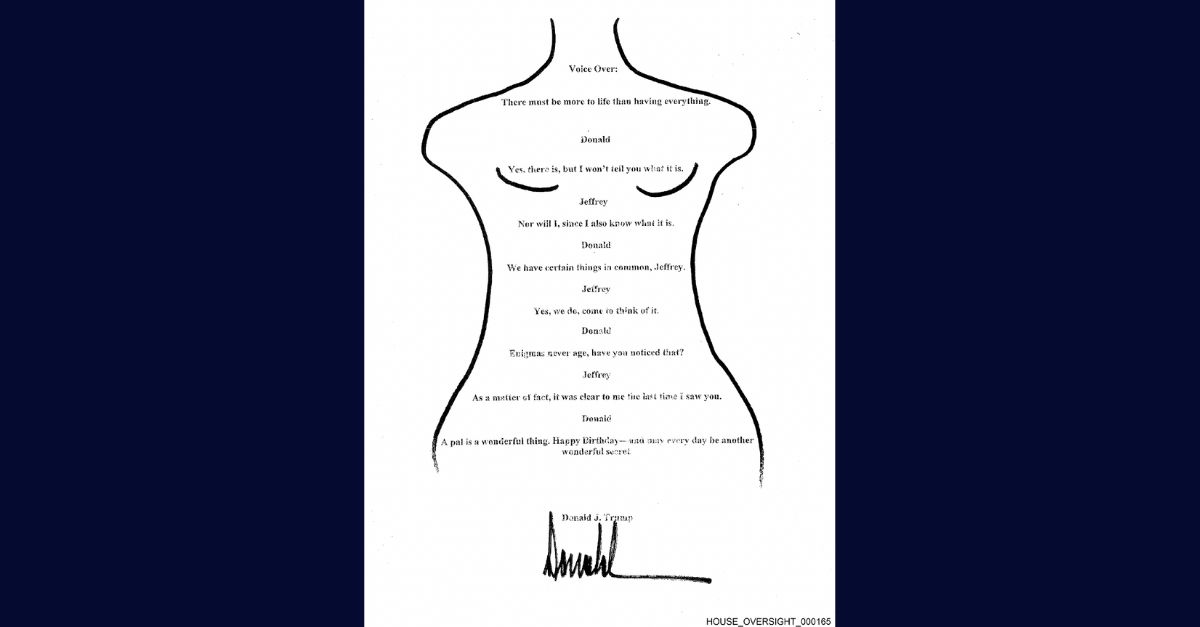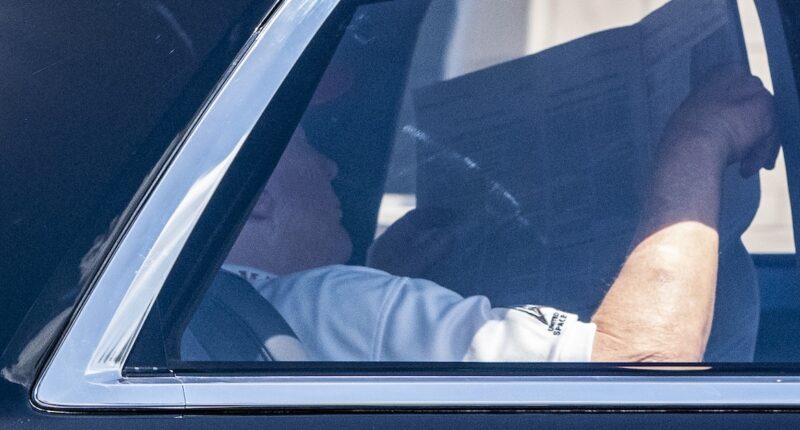Share this @internewscast.com
President Donald Trump is seen reading the Wall Street Journal as he makes his way back to his Mar-a-Lago residence from the Trump National Golf Club on Saturday, April 5, 2025, in West Palm Beach, Florida. (AP Photo/Alex Brandon).
Following Congress’s release of a 50th birthday message for Jeffrey Epstein, which Donald Trump had previously asserted was “fabricated and nonexistent,” the Wall Street Journal has issued its response to the president’s $20 billion defamation lawsuit. The Journal is urging a federal judge to dismiss the case permanently and require the accuser to cover the fees and expenses for filing what they deem a “baseless” claim.
The dismissal motion was initiated on Monday, characterizing Trump’s lawsuit as a significant threat to the First Amendment and an unjust attack on “verifiable” journalism, as proven by the documents from the Epstein estate and the “Birthday Book” submitted to the House Oversight Committee.
“First, the Article is accurate. The Birthday Book, provided by the Epstein estate and subsequently made public by the House Oversight Committee, contains a letter indistinguishable from the one mentioned in the Article,” according to court filings.
As reported earlier this month by Law&Crime, the disclosure of the image that triggered Trump’s legal action is crucial for the Journal’s defense, mainly because the truth is a central element in any defamation suit.
In July, the Journal detailed that the provocative letter featured a sketch portraying a naked woman with “Donald” signed “below her waist” in a manner that “replicates pubic hair,” along with a “typed note crafted as an imaginary chat between Trump and Epstein, presented in the third person — containing the message “Happy Birthday — and may every day be another delightful secret.”
Trump threatened to sue the WSJ prior to the publication, then immediately sued the next day in the U.S. District Court for the Southern District of Florida, claiming that “no authentic letter or drawing exists.”
Since then, the letter the report spoke of emerged, and that’s one of three “independent” reasons Trump’s lawsuit should be thrown out with prejudice, so it can’t be filed again, the Journal argued.

The Jeffrey Epstein birthday book letter, signed by ‘Donald’ (House Oversight Committee via Epstein’s estate)
After denying the letter’s existence, the White House shifted gears and claimed that the signature on the letter is not Trump’s.
But the Journal seems to claim that the response is a red herring for the lawsuit, as the article did not claim Trump “personally crafted the letter.”
Even if the story did make that claim, however, “there is nothing defamatory about a person sending a bawdy note to a friend, and the Article cannot damage Plaintiff’s reputation as a matter of law,” the filing said, before elaborating on Trump’s reputation.
Exhibits filed along with the motion to dismiss included a transcript of Trump’s 2005 “Access Hollywood” tape remarks, as well as other past quotes. The reference was made in support of the additional argument that Trump could not be defamed by the birthday letter reporting because he has a history of making “bawdy public statements” and the letter is “consistent” with that reputation.
“Plaintiff cannot allege harm to his reputation based upon the letter’s bawdy nature because he has a well-documented reputation for bawdiness based on his past statements about women,” the motion said. “During the 2016 election, there was widespread media coverage of a 2005 ‘Access Hollywood’ recording, in which Plaintiff described how he approaches women: ‘I don’t even wait. And when you’re a star, they let you do it. You can do anything. . . . Grab them by the p—-. You can do anything.”
“Any allegation that President Trump wrote a bawdy birthday note is thus consistent with his public reputation—which he has himself acknowledged—for using ‘locker room’ talk and does not plausibly state any harm,” the filing added.
Given the foregoing, attorneys for the Journal, its reporters and Rupert Murdoch argue that the case should not only be dismissed but Trump should also be responsible for paying their attorneys’ fees and costs. The defendants alleged the suit runs afoul of either Florida or New York anti-Strategic Lawsuits Against Public Participation (anti-SLAPP) laws because the case was filed “without merit” or “without a substantial basis in fact and law” — and to “chill” free speech.
“This case calls out for dismissal. In an affront to the First Amendment, the President of the United States brought this lawsuit to silence a newspaper for publishing speech that was subsequently proven true by documents released by Congress to the American public,” WSJ concluded. “By its very nature, this meritless lawsuit threatens to chill the speech of those who dare to publish content that the President does not like. This lawsuit should not be permitted to proceed because ‘[f]orcing publishers to defend inappropriate suits through expensive discovery proceedings . . . would constrict’ the ‘breathing space’ that the First Amendment demands.”
As the newspaper makes its case for dismissal, court documents also show that WSJ has added a familiar name to its legal team, one Steven Engel, formerly of the DOJ’s Office of Legal Counsel during Trump’s first term. U.S. District Judge Darrin Gayles, a Barack Obama appointee, permitted Engel to enter the case on Monday.
Engel memorably worked with former Deputy Attorney General Rod Rosenstein on a memo that concluded the evidence from then-special counsel Robert Mueller’s investigation did not support charging Trump with obstructing the Russia probe.
Engel also authored a draft memo in the event that Trump decided to invoke the Insurrection Act in the aftermath of George Floyd’s murder.














